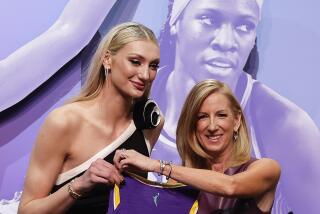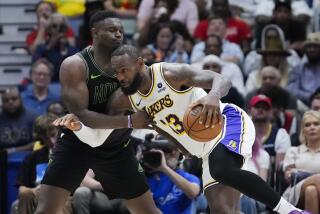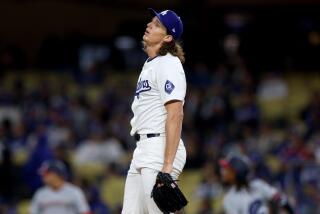Landis retests show drugs, report says
The doping case against Tour de France champion Floyd Landis erupted in renewed controversy Monday as a French sports newspaper reported that retests of several of the cyclist’s old urine samples showed evidence of drug-taking, and Landis contended that his representatives had been prevented from fully witnessing the disputed tests.
Landis’ lawyers contended that any results from those tests would be hopelessly tainted by questionable procedures and a lack of objectivity at the laboratory that performed them. They said they would file a protest with a panel of arbitrators overseeing the case.
That French government-owned lab has been placed under the spotlight by Landis’ defense, which contends that it mishandled the Tour de France samples and misinterpreted the test results on which the original doping allegation was based. The latest results, said Maurice Suh, an attorney for Landis, are likely to be similarly flawed. “They don’t come as any surprise to us,” he said.
Landis’ defense also contended that the results were improperly leaked to the French newspaper, L’Equipe, by the U.S. Anti-Doping Agency, or USADA, which is prosecuting the case, or by the lab.
Suh’s co-counsel, Howard Jacobs, noted that L’Equipe has frequently published leaked results of tests performed at the French lab, which is known as LNDD, the acronym of its French name. Under anti-doping program rules, test results are supposed to remain confidential until an athlete has had an opportunity to review them.
“This is a recurring problem,” he said. “The leak could only have come from USADA or LNDD.”
L’Equipe did not give details of the findings in its brief online report Monday, beyond stating that the carbon-isotope ratio test showed “traces of synthetic testosterone.”
Landis said in an interview Monday that he found the latest developments “frustrating” but believed they would not affect the views of his supporters, given the questions he has raised about USADA and LNDD procedures.
“I don’t think anyone who’s been watching all of this would be surprised not only by the results, but by the leak,” he said. “I hope that over the last nine months we’ve educated people not to believe what they see coming from L’Equipe and that lab.”
USADA’s general counsel, Travis Tygart, refused to comment, saying the agency was barred from commenting on ongoing cases.
Landis won last summer’s Tour de France with a late come-from-behind surge. Several days later, he was charged with doping with synthetic testosterone during one stage of the grueling race. The charge was based on an urinalysis by LNDD.
Landis is disputing the charge before a three-member arbitration panel, which is scheduled to begin a public hearing May 14. If he loses that challenge and a subsequent appeal, he will face a two-year suspension from racing and the loss of his Tour de France title.
At issue in the latest furor are seven urine samples taken from Landis during last summer’s race. Although all had previously tested negative, USADA demanded retests on their backup, or B, portions for use as possible evidence at the hearing.
Landis opposed the retesting, arguing that under anti-doping program rules the samples could not be used as evidence to establish a doping case because they had already been found clean. He also contended that LNDD should be disqualified from performing the new tests because the lab would be in a position of validating its own previous work, producing a conflict of interest.
“We knew they could no longer perform an unbiased analysis,” Suh said.
The arbitrators permitted the retesting but withheld judgment on whether they would accept the results as evidence. They also authorized Landis to send his own experts to witness the new tests.
However, Landis’ attorneys said Monday that the cyclist’s two witnesses were barred during the weeklong procedure from viewing several steps of the testing and analysis, while USADA witnesses viewed the entire process. They said a USADA attorney on the scene also prevented the witnesses from asking pertinent questions about the procedures. They suggested the attorney exceeded his authority by interfering with the witnesses.
On Sunday, while analysis was still going on, Suh said, Paul Scott, one of Landis’ witnesses, was barred from entering the lab. The reason given, he said, was that USADA’s witnesses had already left Paris and the lab would not allow Landis’ team to view the procedure if a USADA witness was not also present.
More to Read
Get our high school sports newsletter
Prep Rally is devoted to the SoCal high school sports experience, bringing you scores, stories and a behind-the-scenes look at what makes prep sports so popular.
You may occasionally receive promotional content from the Los Angeles Times.






